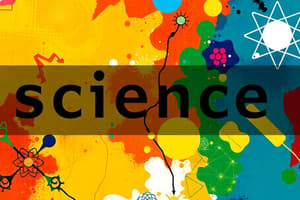Podcast
Questions and Answers
What is the primary focus of Natural Sciences?
What is the primary focus of Natural Sciences?
- Study of human behavior
- Study of natural phenomena (correct)
- Application of scientific knowledge to practical problems
- Development of abstract concepts
Which step in the scientific method involves proposing a testable prediction?
Which step in the scientific method involves proposing a testable prediction?
- Hypothesis (correct)
- Observation
- Analysis
- Conclusion
What characteristic of scientific knowledge ensures that it can be adjusted with new findings?
What characteristic of scientific knowledge ensures that it can be adjusted with new findings?
- Empirical
- Cumulative
- Universal
- Tentative (correct)
Which of the following is a key aspect of Applied Sciences?
Which of the following is a key aspect of Applied Sciences?
Which statement best describes Interdisciplinary Research in science?
Which statement best describes Interdisciplinary Research in science?
What principle of scientific knowledge indicates that findings apply across different contexts?
What principle of scientific knowledge indicates that findings apply across different contexts?
Why is the communication of scientific results important?
Why is the communication of scientific results important?
Which scientist is known for their work in the field of radioactivity?
Which scientist is known for their work in the field of radioactivity?
Study Notes
Definition of Science
- Systematic enterprise that builds and organizes knowledge in the form of testable explanations and predictions about the universe.
Key Branches of Science
-
Natural Sciences
- Focus on the study of natural phenomena.
- Includes Physics, Chemistry, Biology, Earth Science.
-
Social Sciences
- Study of human behavior and societies.
- Includes Psychology, Sociology, Anthropology, Economics.
-
Formal Sciences
- Study of abstract concepts and systems.
- Includes Mathematics, Logic, Computer Science.
-
Applied Sciences
- Application of scientific knowledge to practical problems.
- Includes Engineering, Medicine, Environmental Science.
Scientific Method
-
Observation
- Identifying phenomena to study.
-
Question
- Formulating a specific question based on observations.
-
Hypothesis
- Proposing a testable prediction or explanation.
-
Experimentation
- Conducting experiments to test the hypothesis.
-
Analysis
- Analyzing data collected from experiments.
-
Conclusion
- Drawing conclusions and determining if the hypothesis is supported.
-
Communication
- Sharing results for peer review and further inquiry.
Importance of Science
- Enhances understanding of natural and social worlds.
- Drives technological advancement.
- Informs public policy and decision-making.
- Contributes to economic growth.
Characteristics of Scientific Knowledge
- Empirical: Based on observation and experimentation.
- Tentative: Open to revision based on new evidence.
- Cumulative: Builds on previous knowledge.
- Universal: Applies consistently across different contexts.
Famous Scientists and Their Contributions
- Isaac Newton: Laws of motion and gravity.
- Charles Darwin: Theory of evolution by natural selection.
- Marie Curie: Research on radioactivity.
- Albert Einstein: Theory of relativity.
Current Trends in Science
- Interdisciplinary research.
- Focus on sustainability and climate change.
- Advancements in artificial intelligence and biotechnology.
- Increasing collaboration across global scientific communities.
Definition of Science
- A systematic endeavor that creates and organizes knowledge through testable explanations and predictions regarding the universe.
Key Branches of Science
- Natural Sciences: Concentrate on natural phenomena, encompassing disciplines such as Physics, Chemistry, Biology, and Earth Science.
- Social Sciences: Explore human behavior and societal interactions, represented by fields including Psychology, Sociology, Anthropology, and Economics.
- Formal Sciences: Investigate abstract concepts and systemic frameworks, which include Mathematics, Logic, and Computer Science.
- Applied Sciences: Employ scientific findings to solve real-world issues, incorporating domains such as Engineering, Medicine, and Environmental Science.
Scientific Method
- Observation: Recognizing phenomena for investigation.
- Question: Developing specific inquiries guided by observations.
- Hypothesis: Crafting a testable prediction or explanation.
- Experimentation: Carrying out experiments to validate the hypothesis.
- Analysis: Evaluating data obtained from experiments.
- Conclusion: Formulating conclusions to ascertain if the hypothesis is upheld.
- Communication: Distributing findings for peer evaluation and further exploration.
Importance of Science
- Advances comprehension of both natural and social environments.
- Fuels technological progress and innovation.
- Shapes public policies and decision-making processes.
- Contributes significantly to economic development.
Characteristics of Scientific Knowledge
- Empirical: Grounded in observation and experimental data.
- Tentative: Subject to change with the emergence of new evidence.
- Cumulative: Builds incrementally upon existing knowledge frameworks.
- Universal: Consistently applicable across various contexts.
Famous Scientists and Their Contributions
- Isaac Newton: Formulated the laws of motion and universal gravitation.
- Charles Darwin: Developed the theory of evolution via natural selection.
- Marie Curie: Pioneered research in radioactivity, significantly advancing the field.
- Albert Einstein: Introduced the theory of relativity, revolutionizing understanding of physics.
Current Trends in Science
- Increasing emphasis on interdisciplinary research approaches.
- Growing focus on sustainability and addressing climate change challenges.
- Significant advancements in fields like artificial intelligence and biotechnology.
- Rising collaboration among global scientific communities to tackle complex issues.
Studying That Suits You
Use AI to generate personalized quizzes and flashcards to suit your learning preferences.
Description
Explore the definition of science and its major branches, including natural, social, and formal sciences. This quiz will test your understanding of the systematic approach to building knowledge and the various fields within the scientific discipline.



